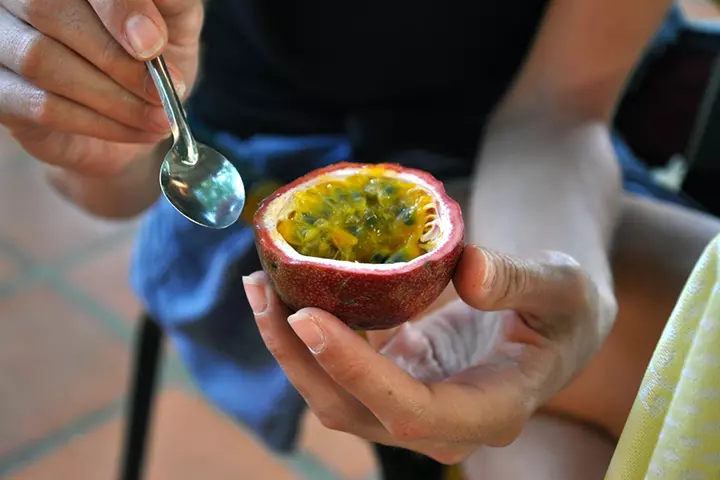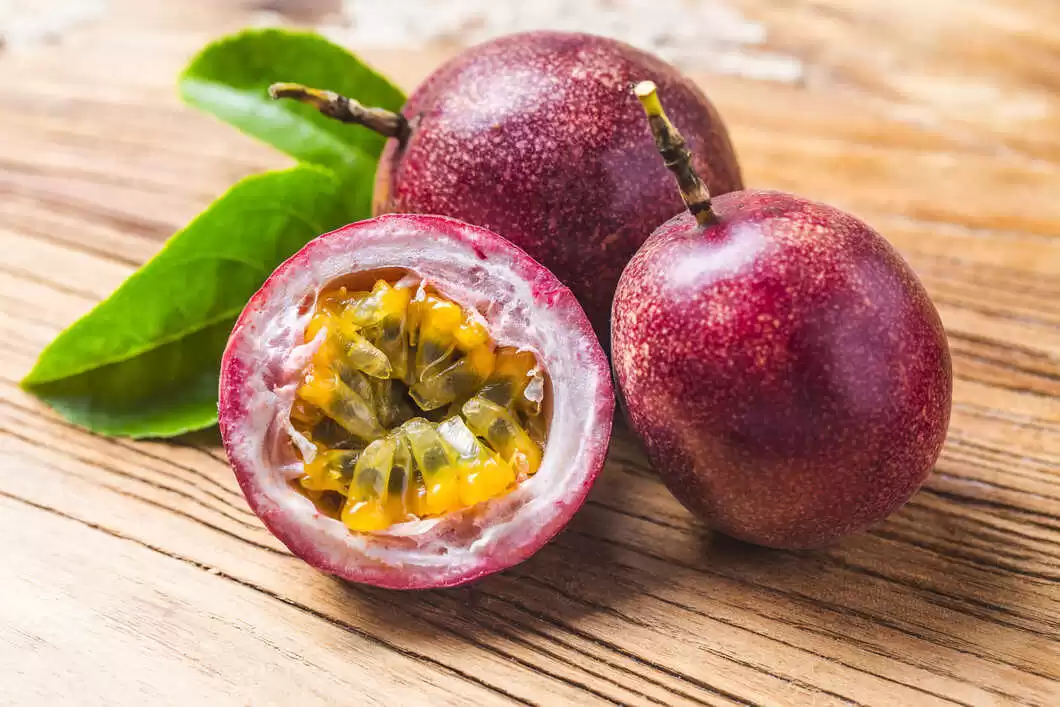Passion fruit, with its vibrant color and unique taste, is often seen as a tropical treat. But did you know it also has potential health benefits for those managing diabetes? This article delves into the benefits, effects, and other important aspects of passion fruit for diabetics.
Understanding Passion Fruit
Passion fruit is a tropical fruit known for its sweet yet tangy flavor and aromatic pulp. It’s often used in juices, desserts, and as a garnish. The fruit comes in two main varieties: purple and yellow. Both types offer a wealth of nutrients, including vitamins A and C, dietary fiber, and beneficial plant compounds.
Nutritional Value of Passion Fruit
Passion fruit is packed with nutrients that can support overall health. It’s rich in dietary fiber, vitamin C, vitamin A, potassium, and iron. The fiber content is particularly noteworthy as it helps regulate blood sugar levels, making it a valuable addition to a diabetic diet. The antioxidants in passion fruit, such as beta-carotene and polyphenols, also play a role in reducing oxidative stress and inflammation.
Glycemic Index and Glycemic Load
When managing diabetes, understanding the glycemic index (GI) and glycemic load (GL) of foods is crucial. Passion fruit has a low glycemic index, meaning it doesn’t cause rapid spikes in blood sugar levels. This makes it a safe option for those monitoring their glucose intake. The glycemic load, which considers the carbohydrate content and portion size, is also low, ensuring that passion fruit can be consumed without significantly impacting blood sugar.

Benefits of Passion Fruit for Diabetics
Here are the benefits of passion fruits for diabetics patient.
1. Blood Sugar Regulation
The dietary fiber in passion fruit is a key factor in blood sugar management. Fiber slows the absorption of sugar into the bloodstream, preventing sudden spikes and promoting steady glucose levels. Soluble fiber, in particular, forms a gel-like substance in the gut that helps control blood sugar levels post-meal.
2. Weight Management
Maintaining a healthy weight is essential for diabetes management, and passion fruit can aid in this. It’s low in calories but high in fiber, which promotes satiety and reduces the likelihood of overeating. This can help diabetics manage their weight more effectively, contributing to better overall health.
3. Antioxidant Properties
Oxidative stress is a concern for diabetics as it can exacerbate complications related to the condition. Passion fruit is rich in antioxidants, such as vitamin C and polyphenols, which help neutralize free radicals and reduce oxidative stress. This not only supports general health but also helps protect against diabetes-related complications.
4. Cardiovascular Health
Cardiovascular health is a significant concern for diabetics, and passion fruit can contribute positively in this area. The fruit’s high potassium content helps regulate blood pressure, while the fiber and antioxidants support heart health by reducing cholesterol levels and preventing arterial damage.
Potential Side Effects of Eating Passion Fruit
While passion fruit offers numerous benefits, it’s essential to consume it in moderation. Excessive intake may lead to digestive issues such as bloating or diarrhea due to its high fiber content. Additionally, some people may be allergic to passion fruit, so it’s important to monitor for any adverse reactions, especially when trying it for the first time.
Adding Passion Fruit into Your Diet
There are several delicious and healthy ways to include passion fruit in your diet. You can add the pulp to smoothies, yogurt, or salads for a nutrient boost. Passion fruit juice, though tasty, should be consumed in moderation due to its natural sugar content. For a refreshing twist, use passion fruit as a topping for oatmeal or desserts.
Passion Fruit Recipes for Diabetics

Passion Fruit Smoothie
A passion fruit smoothie is an excellent way to enjoy the fruit’s benefits. Blend the pulp with low-fat yogurt, a handful of spinach, and a splash of almond milk. This smoothie is not only delicious but also packed with fiber, vitamins, and antioxidants.
Passion Fruit Salad
For a light and refreshing option, try a passion fruit salad. Combine mixed greens, cherry tomatoes, cucumber, and avocado with the pulp of one passion fruit. Drizzle with a light vinaigrette and enjoy a nutrient-rich, diabetic-friendly meal.
Passion Fruit Infused Water
Infusing water with passion fruit is a great way to stay hydrated and enjoy the fruit’s flavor without added sugars. Simply add the pulp to a jug of water and let it sit for a few hours. This makes for a refreshing drink that can be enjoyed throughout the day.
Comparing Passion Fruit to Other Fruits
When managing diabetes, it’s helpful to compare the benefits of passion fruit with other fruits. While berries, apples, and oranges are also good choices due to their fiber and low GI, passion fruit stands out for its unique combination of fiber, antioxidants, and low glycemic load. This makes it a particularly beneficial option for those looking to vary their fruit intake while keeping blood sugar levels in check.
Passion Fruit Supplements
For those who may not have access to fresh passion fruit, supplements can be an alternative. Passion fruit extract is available in capsule or powder form and can offer some of the benefits of the fruit itself. However, it’s important to choose high-quality supplements and use them as part of a balanced diet.
Potential Interactions with Medications
If you are on medication for diabetes, it’s essential to consider potential interactions with foods like passion fruit. While the fruit itself is generally safe, its high vitamin C content can affect the absorption of certain drugs. Always ensure that any dietary changes complement your existing treatment plan effectively.
Long-Term Benefits
Adding passion fruit into your diet can offer long-term health benefits beyond blood sugar management. The antioxidants, vitamins, and minerals in passion fruit support overall health, potentially reducing the risk of other chronic conditions. Regular consumption can contribute to sustained well-being and better management of diabetes.
Cultural Significance and Usage
Passion fruit is not only prized for its health benefits but also holds cultural significance in many tropical regions. In South America, it’s known as “maracuyá” and is a staple in local cuisine. Understanding the cultural context of passion fruit can enhance appreciation for this nutritious fruit and inspire new ways to incorporate it into your diet.
Conclusion
Passion fruit emerges as a beneficial addition to a diabetic diet, offering a range of health benefits from blood sugar regulation to improved cardiovascular health. Its rich nutritional profile, low glycemic index, and antioxidant properties make it a standout choice for those managing diabetes. By incorporating passion fruit into your meals and snacks, you can enjoy its unique flavor while reaping its many health benefits. So next time you’re looking for a healthy, tasty treat, consider reaching for a passion fruit. Your body will thank you.
